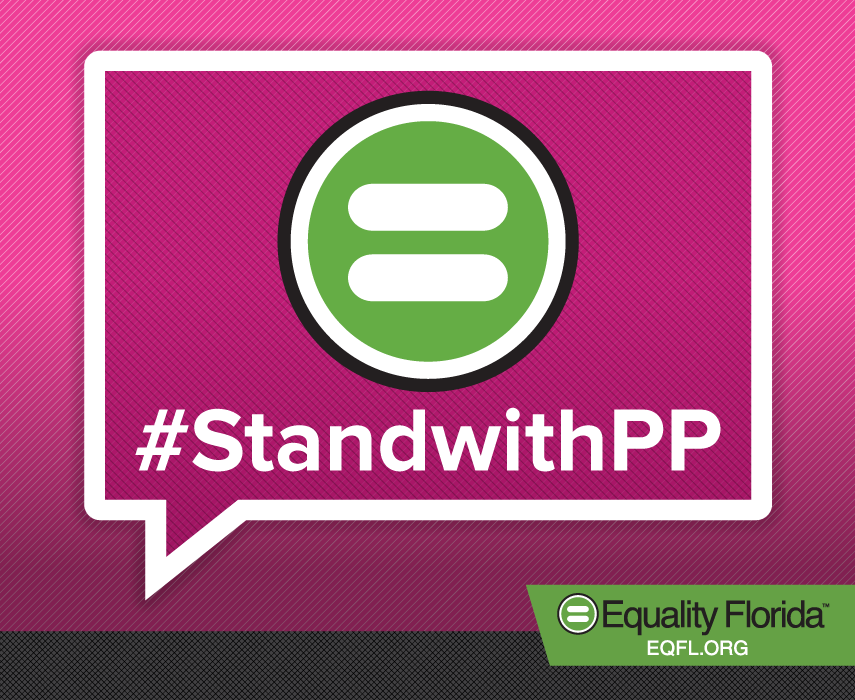Equality Florida stands with Planned Parenthood
Equality Florida is proud to stand with Planned Parenthood. For years we have fought side-by-side to ensure quality healthcare & reproductive freedom for women, comprehensive sex education for teens, and equality for all LGBT people. We condemn the smear tactics used against this wonderful organization that serves so many in our state.

From our founding, Equality Florida has been a pro-choice organization and a proud member of Causes in Common. One of the goals of Causes in Common in demonstrating the linkages between the Reproductive Justice and LGBT Movements is to show that our missions are already inherently interconnected. As a pro-choice organization, Equality Florida recognizes that the term pro-choice is not limited to a position on abortion access, but encompasses a much broader advocacy of sexual life liberated from reproductive function. It includes the right to choose whether or not to have children as well as the right to a life free from governmental scrutiny and intrusion in our sexual and reproductive lives. Therefore, a pro-LGBT mission should imply a pro-choice mission and vice versa. The Equality Florida Action PAC requires candidates to be pro-choice.
What is the connection between reproductive justice and LGBT liberation?
• Historical connections:
The common ground for our movements has a long and rich history even though we have often been strategically divided. Reproductive freedom was a linchpin of the modern Feminist Movement of the 1960s and 1970s. The advent and easier availability of more advanced reproductive technologies liberated women from unwanted pregnancy as a consequence of heterosexual sex. When women could take control of their reproductive destinies, they also had more control over their own sexual pleasure. The freedom and legitimacy of sexual activity without reproduction as an outcome is as fundamental to the liberation of LGBT people as it is to heterosexual women and their male partners.
• Legal underpinnings:
Legal advocates are perhaps the most aware of the intersections between our movements, for they can clearly see the connections in the work they do fighting for LGBT liberation and/or Reproductive Justice every day. The decisions in Griswold v. Connecticut (1965) and Eisenstadt v. Baird (1972) held first that criminal prohibition of contraceptive devices for married couples, and later for any individual, violated a fundamental right of privacy. These cases helped lay the groundwork for an argument that the individual has a right to decide how and when to engage in consensual sexual activity. Furthermore, the fact that the 2003 Supreme Court Lawrence v. Texas decision decriminalizing same-sex relations between consenting adults relied upon two of the most influential reproductive rights cases—Roe v. Wade and Planned Parenthood v. Casey—emphasizes that attacks on either of our struggles can no longer be separated.
• Shared enemies:
There is a right-wing political agenda that targets both reproductive freedom and LGBT rights. It would control sexuality, gender conformity, reproductive choice and the legal definitions of family. Those behind this agenda seek to change the make-up of the Supreme Court to roll back the hard-won gains of both our movements.
• Policy intersections:
Good policies have the benefit of moving our communities forward, while policies sponsored by right-wing extremists attacking reproductive justice and LGBT liberation have detrimental effects on all of us. For example, the Bush administration’s “Marriage Imperative” for low-income families not only works against women who are trying to escape abusive situations, but also actively discriminates against LGBT people who are not allowed to marry. Sex education programs that promote “abstinence until marriage” serve to deny young people information about “safer sex” and prevention of pregnancy and HIV/AIDS. They also further marginalize and alienate LGBT youth by deeming their sexuality pathological. Health insurance policies often refuse to cover contraception, emergency contraception, and abortion. Likewise, these policies often have restrictions on or lack of coverage for infertility services, especially services needed to create LGBT families. These are just a few of the many policy intersections that affect both our movements.

